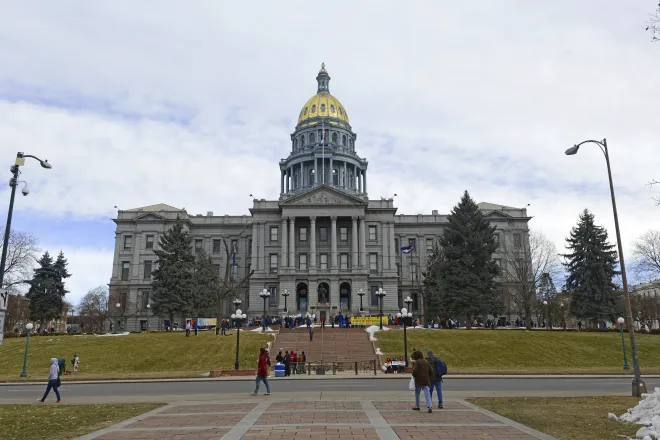
Daily Audio Newscast - November 3, 2025
© AlexLMX - iStock-823000260
Six minutes of news from around the nation.
SNAP Update: treasury secretary reveals potential payout date; Washington shutdown hinders Nebraska farm finances; Rural Mainers lose primary care access due to Medicaid funding cuts; FL city proclamation celebrates USPS 250th anniversary; Report: Child poverty rate soars to 15% in Nevada.
TRANSCRIPT
The Public News Service Daily Newscast, November the 3rd, 2025.
I'm Mike Clifford.
Treasury Secretary Scott Bessen said on CNN's State of the Union Sunday that supplemental nutrition assistance program benefits, which impact roughly 42 million Americans, could resume as soon as Wednesday.
That's for Newsweek.
The report on Friday, two federal judges ruled the administration must continue to pay the benefit with emergency funds.
The delay in payouts is expected to leave millions of people without sufficient funds for their groceries.
And from Axios, even if the Trump administration does comply with orders to ensure SNAP benefits are at least partially paid, it's still unclear when millions of families will actually receive their aid, and any relief would be just a temporary fix.
Meantime, as the government shutdown in Washington enters its sixth week, Nebraska farmers are feeling the financial pinch.
Many rely on farm loans that are being held up by departments that have been shuttered during the budget impasse that led to the closure.
Nebraska Farmers Union President John Hanson says the shutdown has added even more pressure on newer farmers because they can't access the federal farm service agency loan to the need to cover basic operating expenses.
Those producers that are the most vulnerable are those that have been in agriculture the shortest amount of time, which is about a fourth of all the ag producers have been in for less than 10 years.
So they don't have as much equity and they have more operating debt to service.
Hansen says Nebraska farmers are already reeling from the effect of tariffs that have made their products harder to sell, and the government shutdown is adding additional pressure.
Hansen adds that ag production costs have continued to rise, but commodity prices have remained steady or fallen, putting farmers' finances in a bind.
The input costs continue to go up year after year after year.
I'm Mark Moran.
And the largest network of reproductive health clinics serving rural Mainers has closed its primary care operations.
That's due to Medicaid funding cuts.
A provision within the federal budget reconciliation bill passed earlier this year prohibits reimbursements for any provider whose services include abortion.
Olivia Pennington with Maine Family Planning says more than half the network's patients live in remote areas already struggling with a healthcare shortage.
We have providers who see patients across generations of the same family.
People trust us because we've earned their trust.
She says roughly 70 percent of patients rely exclusively on the network for their healthcare needs, with people already driving long distances for cancer screenings or wellness visits.
The network will continue to provide reproductive health services through the use of grants and private donations.
I'm Catherine Carley.
An ongoing lawsuit filed on Maine Family Planning's behalf asks for emergency relief so the network is not forced to turn away patients who rely on Medicaid and can't afford out-of-pocket costs.
This is Public News Service.
The 250th anniversary of the U.S. Postal Service is a milestone that predates the nation itself, and its advocates want to shine a light on its immense and often unseen workforce that delivers mail and packages to every American address.
The Miami-Dade County Mayor's Office is just one that has issued a proclamation recognizing the postal service.
This comes as union leaders sound the alarm about renewed talks of privatizing the nation's mail delivery.
Wanda Harris, who leads postal operations for a large region of South Florida, calls the agency a national treasure built for the people.
The challenges we're facing right now at hand, we're facing postal privatization, we're facing banning mail-in ballots.
Just those two things alone can impact us to where the American people will be crushed.
Because if we're privatized, of course, everything will be very much more expensive.
The first Trump administration supported changes that union leaders warned could lead toward privatization.
And earlier this year, President Donald Trump said he was considering putting the service under control of the US Commerce Department.
I'm Tramell Gomes.
And as President Trump makes good on campaign promises to deport immigrants living in Colorado and across the US without proper documentation, a new report spotlights the economic risk to Social Security and other programs that rely on payroll tax revenues.
As America's baby boomers continue to retire, the number of US-born workers is expected to dramatically decrease over the next decade.
Report author Josh Bivens says historically normal GDP growth rates will be impossible to maintain without immigrant workers.
It does make things like Social Security and Medicare a little harder to sustain.
If we have a steady flow of younger immigrant workers in that just makes it much easier to sustain those really important social insurance programs.
Medicare and Social Security are largely funded by today's workers regardless of their immigration status through payroll taxes.
I'm Eric Galatas.
Finally, child poverty in Nevada hit 15 percent last year, two points higher than the national average.
That's according to a new analysis by the Annie E. Casey Foundation.
Researchers found that the national child poverty rate almost tripled from 5 to 13 percent between 2021 and 2024, largely because Congress allowed pandemic-era policies providing extra support to low-income families to expire.
Leslie Bossier with the Annie E. Casey Foundation says a high concentration of poverty is a risk to a child's safety, health, and success in school.
Those neighborhoods often have higher crime rates.
Schools tend to have more resources and consequently the academic achievement of the children tends to be lower.
You also see significant stress on families and that stress has a direct impact on the well-being of children.
The numbers are much worse for children of color.
I'm Suzanne Potter.
This is Mike Clifford for Public News Service.
Member and listener supported.
Find our trust indicators at publicnewsservice.org.
















